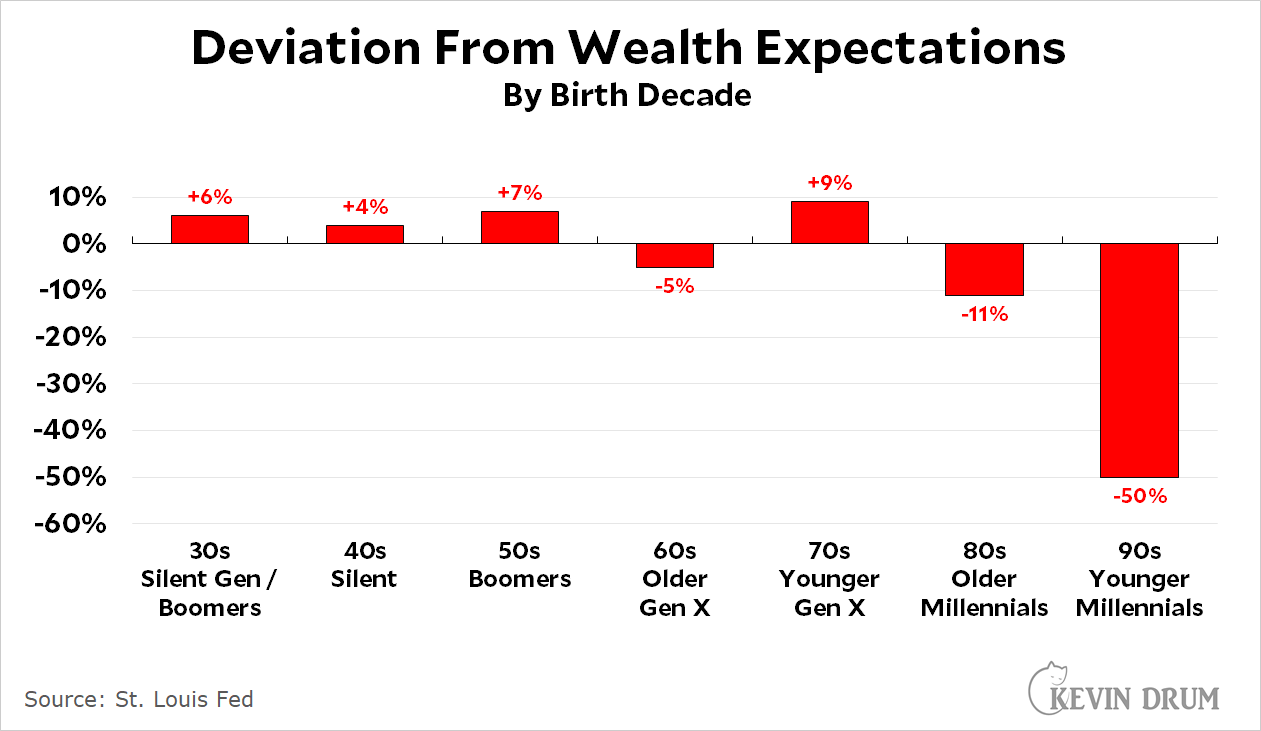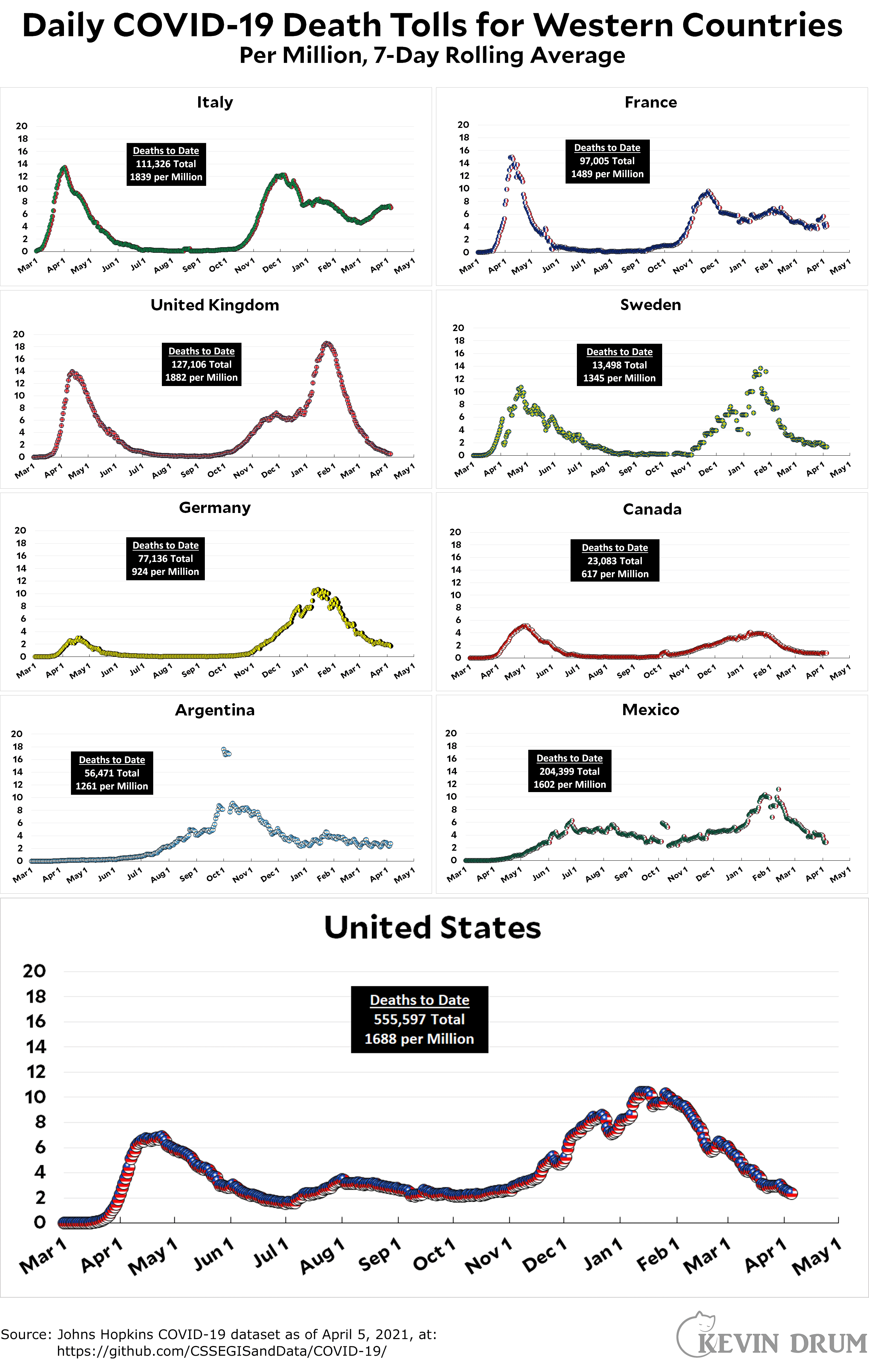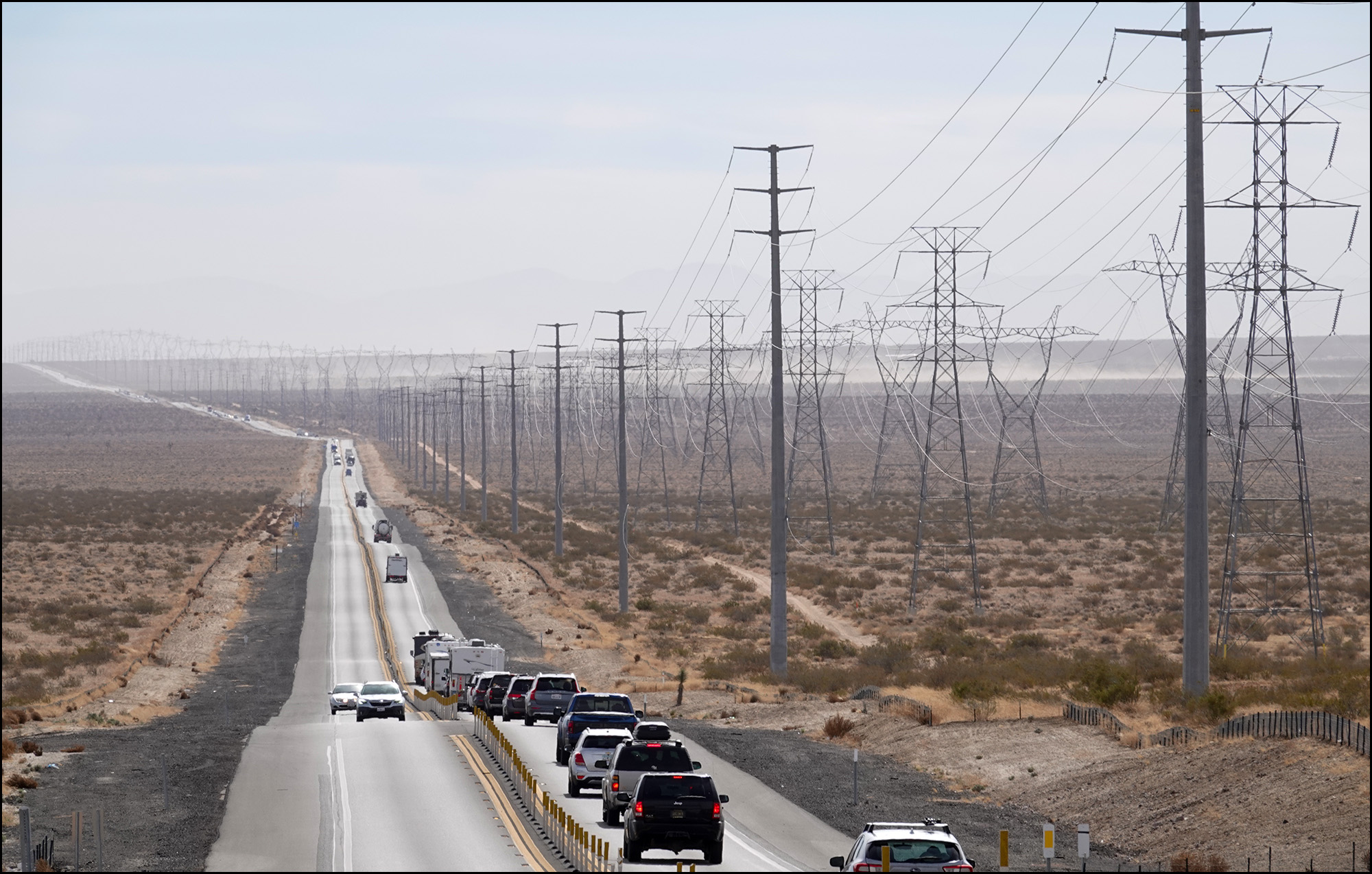Here’s the officially reported coronavirus death toll through April 6. The raw data from Johns Hopkins is here.

Cats, charts, and politics

Here’s the officially reported coronavirus death toll through April 6. The raw data from Johns Hopkins is here.

Atrios has a comment on a couple of New York Times op-ed regulars:
Who is the audience for things like, "Gail Collins and Bret Stephens shoot the shit." Not even picking on them, specifically, though Bret is a disgusting clown even by the low standards of the conservative movement, but genuinely confused that in the year of our Gritty, 2021, there's still a market for this genre of things.
I often wonder about this too, since these conversations are usually held with "reasonable" conservatives who simply don't appear to have any influence within the Republican Party anymore. But there's an answer, and I think it's pretty simple: Those of us whose hobby is politics consistently overestimate how much the rest of the country knows about politics.
Let me be clear: Even when we try really hard to take into account that most people don't know much about politics, we still overestimate how much they know.
It so happens that I have a sort of personal calibration tool for this, which I won't get into. But the gist of it is that even fairly smart people who follow politics a little bit are a million light years away from the kind of hobbyist knowledge that we have. We should think of ourselves as, say, Star Trek nerds who simply can't get it through our heads that about 98% of the country has no idea what we're talking about when we say "He's dead, Jim" in an ironic way. Most people, if they know anything at all, sort of vaguely understand that there's a spaceship, some kind of Spock guy, and maybe a weird finger salute that the geeks are into.
In other words, there's plenty of audience for the Gail and Bret show. It consists of smart people who follow politics a bit but aren't on Twitter, don't read political blogs, and just have opinions because they have opinions. Do they know that Republicans filibuster everything? Nah. Do they know that Republicans all think the election was stolen? Not really. Do they know anything at all about policy issues? Probably not, unless there happens to be one that impinges on their day jobs.
Frankly, for the vast majority of Americans, your best bet is to assume not that they are "low information voters" but that they know nothing about politics. Literally nothing. (Many, of course, know less than nothing because they spend a lot of time listening to Fox News and come away with misinformation that makes them mad. They forget about the misinformation quickly, but they don't forget that they're mad.)
So that's that. No matter how little you think most people know, cut it in half and then cut it in half again. That should get you somewhere close to the truth.
Andrew Sprung has some interesting news: the rate of uninsurance has declined during the pandemic. The main cause seems to be an increase in Medicaid enrollment combined with the fact that most furloughed workers have been allowed to keep their health insurance. Here's a very preliminary look from the CDC's survey of insurance status:

This only goes through the very first few months of the pandemic, but the overall uninsurance rate definitely declined during April-June of 2020 even as millions of workers were being released or furloughed. If Sprung is right, that number kept on decreasing through the end of 2020 and beyond. That's good news.
I guess I can't put this off forever. This is a lovely bird at the San Diego Zoo, but I forgot to take a picture of the ID plaque and I can't seem to figure out what it is from googling. So what is it, folks?
UPDATE; By "folks," everyone knows I meant "Steve." It's a Nicobar Pigeon, a close relative of the extinct dodo.

As you may know, 60 Minutes aired a segment on Sunday that basically accused Florida Gov. Ron DeSantis of corruption for giving Publix supermarkets a contract to vaccinate Floridians. The evidence for this was all but nonexistent, and conservatives are outraged about the affair.
I don't really blame them. One of the problems is that DeSantis is a high-profile Trumpie with obvious ambitions, and Florida has certainly engaged in some questionable behavior. That makes him a target. Nevertheless, I'm hard pressed to find any good evidence that Florida is a serious outlier in COVID-19 mortality even though DeSantis has kept the state more open than most.
Anyway, this got me a little curious about the impact of mask mandates. DeSantis has never issued a statewide mandate and has recently tried to ban local governments from doing so. How much difference has this made?
First I did some puttering around about the effect of mask wearing in general. It's a very difficult thing to measure because higher COVID rates probably cause more mask wearing, which means a crude study will find that mask wearing correlates with higher COVID rates. It's also the case that people who refuse to wear masks are the kind of people who probably engage in other risky behavior too. Everyone is well aware of this, which means researchers have turned to complicated estimates based on natural experiments, instrumental variables, and tons of controls. The upshot is that there's some evidence that increased mask wearing produces reduced COVID infection rates, but above a certain level the effect appears to be both modest and questionable.
That's not the end of the story, though. Even if increasing mask wearing from, say 50% to 55% has an effect, there's another question to answer: do mask mandates cause more people to wear masks in the first place? There's research from last year that suggests they do, but check out this weird-looking scatterplot from a more recent study:

An eyeball check suggests that mask wearing increases only slightly when a state issues a mask mandate. I used a super-special, completely sketchy method to check this out. Here are the results:

I copied two vertical segments of the chart, one from just before the mandate (left) and one from two weeks later (right). Then I blurred both of them out to form uniform fields and converted them to black and white. The right hand image is lighter, which suggests that mask wearing went up, but only a tiny amount.
The study itself agrees that, on a statistical basis, there's no measurable effect. This means there's basically no evidence that statewide mask mandates produce any behavioral change at all.
This is hardly the end of the story, but it does lean in the direction of suggesting that mask mandates don't work because nobody pays attention to them. Perhaps they did earlier in the pandemic, when they were newer and scarier, but not anymore as people have become more jaded. In any case, if this recent study is correct, the level of mask wearing seems like it's now more related to outside factors (the local level of COVID infections, mask mandates from businesses, etc.) than to a proclamation from the governor.
UPDATE: Sorry, I misread the legend. In the original post I suggested that mask wearing had gone down slightly following a mandate, but it's actually up slightly. However, the effect is so small it's basically not measurable.
For years, Millennial finances have been worse than that of previous generation. However, a new study from the St. Louis Fed suggests that after making progress over the past decade they are nearly caught up:

The Fed methodology is to calculate the average "life cycle of wealth" and then compare it to actual wealth. For example, my generation (Boomers born in the '50s) is currently about 7% above expectations for our place in the life cycle (age 60-70).
Older Millennials, it turns out, who took a big hit during the Great Recession, have now made up a lot of ground and are only about 11% below where they should be. That's a huge advance from the deficit of 40-50% they suffered during the Great Recession and its aftermath. By contrast, the cohort of younger Millennials and Gen Z (age 20-30) are still a massive 50% below expectations.
The authors don't speculate about the reasons for this, but I suspect that the life cycle of wealth may have simply changed. It's quite possible that later marriages, more time spent in college, higher housing costs, and later inheritances as lifespans have increased, have fundamentally changed the average wealth of 20-somethings but that those things start to wash out later in life. It's also possible that this is nothing but a statistical artifact caused by the timing of the Great Recession.
In any case, it looks like Millennials are finally catching up, though I suspect we won't know for sure until a few years after the pandemic is over.
Here’s the officially reported coronavirus death toll through April 5. The raw data from Johns Hopkins is here.

This is a big deal:
Chuck Schumer scores a big win as Senate parliamentarian rules that a revised budget resolution may contain budget reconciliation instructions.
This will allow Senate Democrats to move two more reconciliation packages in 2020, averting GOP filibusters.— Alex Bolton (@alexanderbolton) April 5, 2021
(Typo alert: Bolton means 2021, not 2020.)
For the past couple of months Schumer has been arguing that Section 304 of the Congressional Budget Act of 1974 allows two budget reconciliation bills per year, not just one. The second one, he says, can be passed as a revision to the first one as long as the House agrees.
The value of a budget reconciliation bill is that it can't be filibustered and requires only 50 votes to pass. Democrats have already used it once to pass the $1.9 trillion coronavirus bill, and they'd like to use it again to pass President Biden's infrastructure bill. Now, according to the parliamentarian, they can.
This is an end-run around the filibuster, but not a perfect one. Reconciliation bills are limited to things that affect the budget, like taxes and spending, and nothing else. So it's probably OK for an infrastructure bill, but not, say, for a bill to raise the minimum wage of $15.
Nevertheless, there are a fair number of things that fall under the broad umbrella of the budget. Since Democrats control the House—which has to agree to all this—it means they get a chance to pass two big bills this year and then another two later in the year during work on the FY22 budget.
None of this changes the fact that they still have to round up 50 votes in a Senate with 50 Democrats. And it won't help with some of their highest priorities, like the mammoth bill to set federal voting standards. But it still opens up a lot of possibilities.
Behold the awesome beauty of the California high desert.

There are times when I feel like I no longer understand anything. Take money, for example. No one really understands money, so I've never felt too bad about not understanding it myself. Still, at least I had a rough idea of why one thing might be money and another thing wasn't. Sadly, I'm not even sure of that, anymore. Here is the Wall Street Journal today on China's shiny new digital currency:
It might seem money is already virtual, as credit cards and payment apps such as Apple Pay in the U.S. and WeChat in China eliminate the need for bills or coins. But those are just ways to move money electronically. China is turning legal tender itself into computer code.
Huh. China isn't merely moving money digitally, it's turning money itself into digits. I have no idea what that means. Then there's this:
China’s version of a digital currency is controlled by its central bank, which will issue the new electronic money. It is expected to give China’s government vast new tools to monitor both its economy and its people. By design, the digital yuan will negate one of bitcoin’s major draws: anonymity for the user.
So . . . it's not a blockchain currency or anything like that. It's just stuff issued by China's central bank.
But doesn't China's central bank already issue money? Yes, and of course it issues much of it digitally, that being how the world works these days. We could refer to this as digitally issued yuan. The new currency, by contrast, is digital yuan.
So what's the selling point? Here's one possibility:
Digitization wouldn’t by itself make the yuan a rival for the dollar in bank-to-bank wire transfers, analysts and economists say. But in its new incarnation, the yuan, also known as the renminbi, could gain traction on the margins of the international financial system.
It would provide options for people in poor countries to transfer money internationally. Even limited international usage could soften the bite of U.S. sanctions, which increasingly are used against Chinese companies or individuals.
Go ahead and call me cynical, but I don't think China cares even slightly about the ability of people in poor countries to transfer money. In fact, as far I can tell, the real reason behind the e-yuan is that China feels that its citizens are just too damn free. The new currency, since it's purely digital, can be tracked perfectly. The government will know about every penny you spend, and just as e-books are merely "licenses," rather than actual books, the new yuan is programmable. "Beijing has tested expiration dates to encourage users to spend it quickly, for times when the economy needs a jump start."
Uh huh. And check out this non-sequitur: "Beijing is also positioning the digital yuan for international use and designing it to be untethered to the global financial system." That would be a helluva trick, wouldn't it? International but not tied to anything actually international. It makes no more sense to me than it did for the old soft currencies in the communist bloc countries.
Long story short, I don't see anything new here. What I see is a recognition by China that it wants more control over its citizens and it's too late to get that with the current incarnation of the yuan. The horse has already left that particular barn. It's better to start completely over with a currency that keeps everyone on a tight leash.
But that only works if the e-yuan doesn't become an international currency. So perhaps this means that China is planning to have two currencies going forward: the yuan for international use and the e-yuan for domestic use.
WARNING: No one else seems to be interpreting the e-yuan this way. This probably means I don't understand what's going on. But then again, maybe no one else does either.